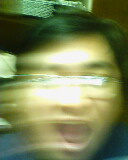On Personal Narrative - Dec. 7, 2005
On Personal Narratives
Dec. 7, 2005
I wish all of you would have the privilege of going over your your classmates’ short autobiographies. The couple of hours I spent reading them gave me more enjoyment than the whole recent JB-Say twist that bothered our collective Filipino weekend. Your stories had more drama (pathos even), romance, comedy, erotica than the whole PBB season combined and some even had a smattering of left and right-wing philosophical musings. In other words, it was like a good Woody Allen movie or the Gilmore Girls or an early E-heads album. Obscure pop culture references aside, let me just relay, after having read all your self-presentations, that you are one interesting bunch of young people seemingly at the threshold of something big (could it be adulthood, yuppiehood, revolutionary praxis, victory, failure?). Your shared life-location or age-demographic may explain the equal parts dread and optimism that I sense in many of your writings. This heady mix swings you from being manically optimistic (“I am a Messiah! I will save many people!” You know who you are! ) to being paranoid and schizophrenic (How about writing a one-page **** you letter to oneself? I think this was the best!).
Seriously, the exercise was meant as a symbolic beginning of sorts. Since the avowed goal of this class was to involve our Filipino “selves” in sociological discourse, let us talk about the many means by which you wove your personal narratives about who you are.
For understandable reasons, most of your narratives begin with a declaration of what your names are. Indeed, the most common method of beginning a biographical narrative is by employing the socially-sanctioned markers that are conveniently given each of us during birth. As a matter of rule, we assume an arbitrary name that will remain with us unfortunately for the rest of our lives. Then your narratives disclose other information that map your location in the social world. Your biological gender, physical features and social class are delicately revealed through stories about your crushes, likes and dislikes, hobbies, and the music you listen to among other things.
Some of you embrace these facts about who you are as definitive markers of your being especially so when one’s social circumstance shelter you from many of the social contradictions that afflict our society. Interestingly, however, some of you express an estrangement with these arbitrary markers of your identity - a valid insight given that you might prefer classier monikers as compared to the combined names of dead relatives some of you assume. Furthermore, after undertaking an inventory of one’s being, others find it difficult to ascertain which aspects of their personalities are actually exempted from the seemingly totalitarian power of the social. After all, your crushes, for the most part, are determined by a set of socially-approved characteristics. Your likes and dislikes more or less follow a socially-influenced format. Your taste is music is probably dictated by the payola schemes of corporate music giants. The God you believe in is probably a product of cultural inertia than meaningful faith. Heck, even the money that you wantonly spend is not yours but filched from your parents who, in one way or another, sell their soul (and other people’s) just to keep you and their bourgeois sensibilities satisfied.
While others depict their lives to be happy and full, I am sure they also share to a certain the degree the intimate and deep sense of unease that some of your classmates feel towards themselves and their surroundings. There is much to be unsettled about when we think about who we “really” are. However, there is even greater cause for anxiety once we expand our vistas beyond the myopic confines of our personal lives and begin to confront the sad collective life we lead as a nation. But we will get to that topic pretty soon.
As you look around the faces of your classmates, you may all seem similar in your general disposition as regular UP students. But behind and beyond this shared identity, are your personal stories of pain and victory, your medals and scars despite your youth. Going to UP for some is a natural and expected culmination of almost 15 years of middle-class private/catholic school education. Others, however, are the few who managed to escape their little barrio and now have the chance of never coming back. For some the future calls them as heirs to the toil of their middle-class suburban parents while others face tomorrow carrying on their shoulders the heavy burden of fulfilling their lower middle-class parent’s failed dreams. Which side are you on? (sigh)
For now, let us take stock of the value of this exercise for our class. 1) If anything, this activity has proven that the Self is an equally interesting and dreadful topic. No matter how low or high your self-esteem may be, thinking about one’s self still elicits a passionate response for most of you. Self-reflection is also an awkward and dreadful prospect in the way that it exposes us to the inadequacies of our being. 2) It is clear as well as that subsumed in your personal narratives is the inescapable confrontation with the Social. It may not have been mentioned directly but your narratives inadvertently map your particular location in our given Third World social order. In the next few meetings, we would continue to probe this dynamic confrontation of the Self and Society.
Game pa ba kayo?


0 Comments:
Post a Comment
<< Home